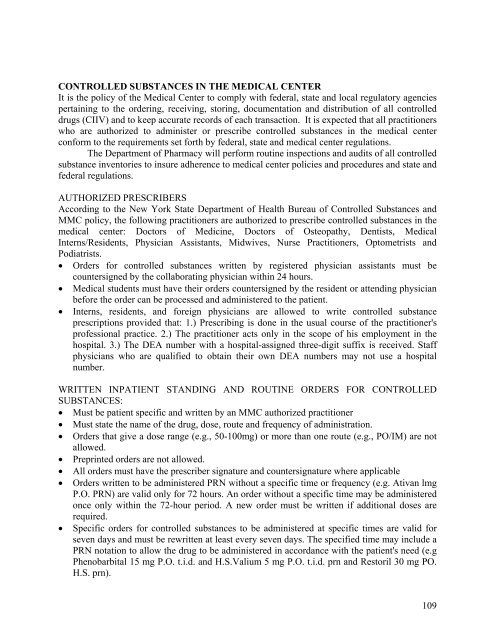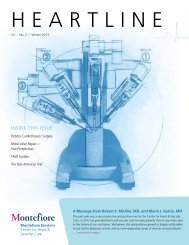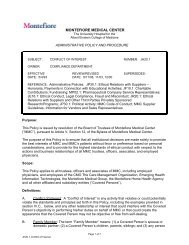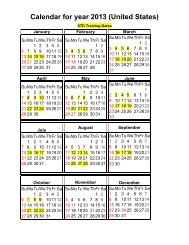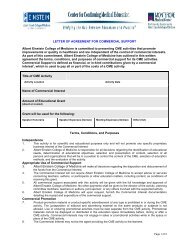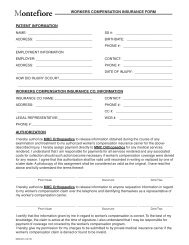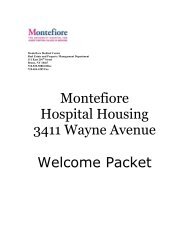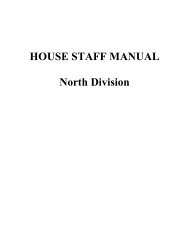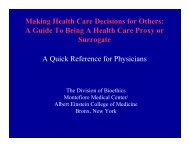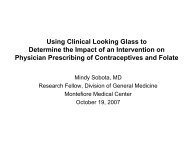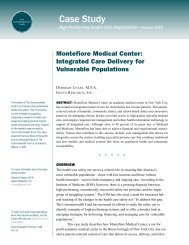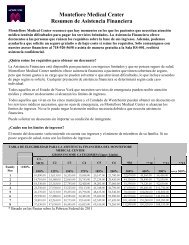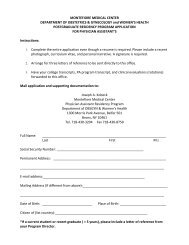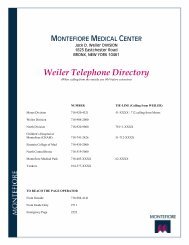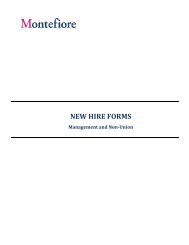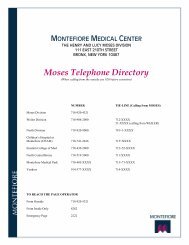Medical Staff House Staff Orientation Manual - Montefiore Medical ...
Medical Staff House Staff Orientation Manual - Montefiore Medical ...
Medical Staff House Staff Orientation Manual - Montefiore Medical ...
Create successful ePaper yourself
Turn your PDF publications into a flip-book with our unique Google optimized e-Paper software.
CONTROLLED SUBSTANCES IN THE MEDICAL CENTER<br />
It is the policy of the <strong>Medical</strong> Center to comply with federal, state and local regulatory agencies<br />
pertaining to the ordering, receiving, storing, documentation and distribution of all controlled<br />
drugs (CIIV) and to keep accurate records of each transaction. It is expected that all practitioners<br />
who are authorized to administer or prescribe controlled substances in the medical center<br />
conform to the requirements set forth by federal, state and medical center regulations.<br />
The Department of Pharmacy will perform routine inspections and audits of all controlled<br />
substance inventories to insure adherence to medical center policies and procedures and state and<br />
federal regulations.<br />
AUTHORIZED PRESCRIBERS<br />
According to the New York State Department of Health Bureau of Controlled Substances and<br />
MMC policy, the following practitioners are authorized to prescribe controlled substances in the<br />
medical center: Doctors of Medicine, Doctors of Osteopathy, Dentists, <strong>Medical</strong><br />
Interns/Residents, Physician Assistants, Midwives, Nurse Practitioners, Optometrists and<br />
Podiatrists.<br />
• Orders for controlled substances written by registered physician assistants must be<br />
countersigned by the collaborating physician within 24 hours.<br />
• <strong>Medical</strong> students must have their orders countersigned by the resident or attending physician<br />
before the order can be processed and administered to the patient.<br />
• Interns, residents, and foreign physicians are allowed to write controlled substance<br />
prescriptions provided that: 1.) Prescribing is done in the usual course of the practitioner's<br />
professional practice. 2.) The practitioner acts only in the scope of his employment in the<br />
hospital. 3.) The DEA number with a hospital-assigned three-digit suffix is received. <strong>Staff</strong><br />
physicians who are qualified to obtain their own DEA numbers may not use a hospital<br />
number.<br />
WRITTEN INPATIENT STANDING AND ROUTINE ORDERS FOR CONTROLLED<br />
SUBSTANCES:<br />
• Must be patient specific and written by an MMC authorized practitioner<br />
• Must state the name of the drug, dose, route and frequency of administration.<br />
• Orders that give a dose range (e.g., 50-100mg) or more than one route (e.g., PO/IM) are not<br />
allowed.<br />
• Preprinted orders are not allowed.<br />
• All orders must have the prescriber signature and countersignature where applicable<br />
• Orders written to be administered PRN without a specific time or frequency (e.g. Ativan lmg<br />
P.O. PRN) are valid only for 72 hours. An order without a specific time may be administered<br />
once only within the 72-hour period. A new order must be written if additional doses are<br />
required.<br />
• Specific orders for controlled substances to be administered at specific times are valid for<br />
seven days and must be rewritten at least every seven days. The specified time may include a<br />
PRN notation to allow the drug to be administered in accordance with the patient's need (e.g<br />
Phenobarbital 15 mg P.O. t.i.d. and H.S.Valium 5 mg P.O. t.i.d. prn and Restoril 30 mg PO.<br />
H.S. prn).<br />
109


